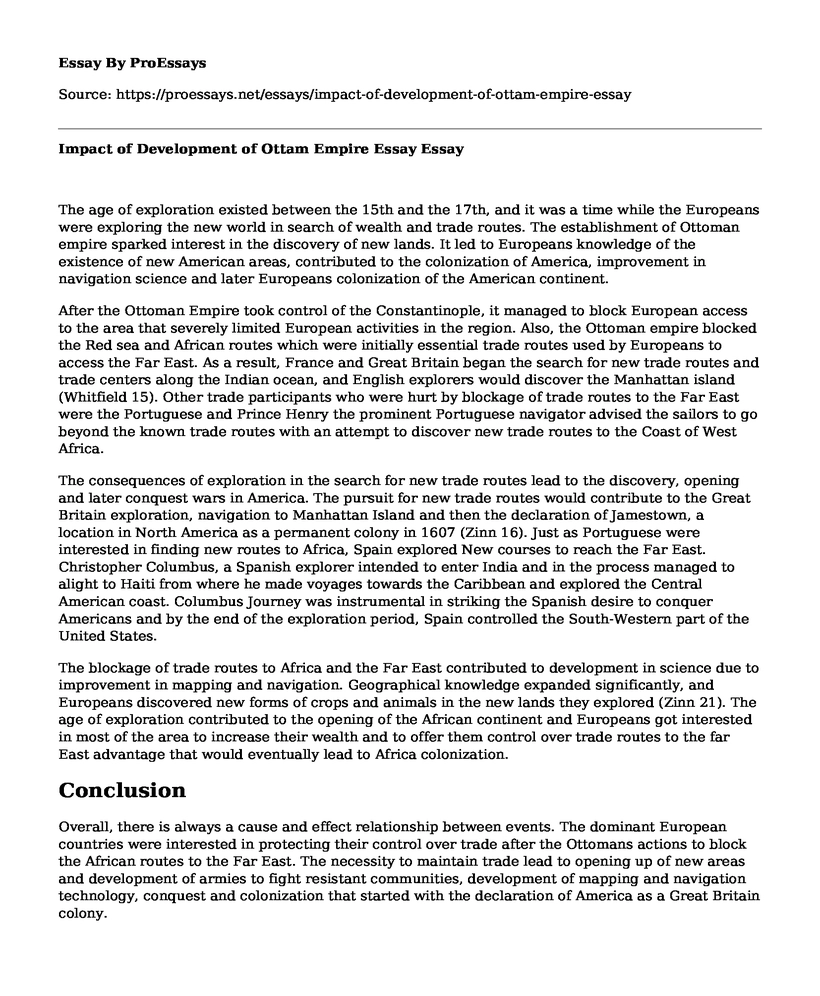The age of exploration existed between the 15th and the 17th, and it was a time while the Europeans were exploring the new world in search of wealth and trade routes. The establishment of Ottoman empire sparked interest in the discovery of new lands. It led to Europeans knowledge of the existence of new American areas, contributed to the colonization of America, improvement in navigation science and later Europeans colonization of the American continent.
After the Ottoman Empire took control of the Constantinople, it managed to block European access to the area that severely limited European activities in the region. Also, the Ottoman empire blocked the Red sea and African routes which were initially essential trade routes used by Europeans to access the Far East. As a result, France and Great Britain began the search for new trade routes and trade centers along the Indian ocean, and English explorers would discover the Manhattan island (Whitfield 15). Other trade participants who were hurt by blockage of trade routes to the Far East were the Portuguese and Prince Henry the prominent Portuguese navigator advised the sailors to go beyond the known trade routes with an attempt to discover new trade routes to the Coast of West Africa.
The consequences of exploration in the search for new trade routes lead to the discovery, opening and later conquest wars in America. The pursuit for new trade routes would contribute to the Great Britain exploration, navigation to Manhattan Island and then the declaration of Jamestown, a location in North America as a permanent colony in 1607 (Zinn 16). Just as Portuguese were interested in finding new routes to Africa, Spain explored New courses to reach the Far East. Christopher Columbus, a Spanish explorer intended to enter India and in the process managed to alight to Haiti from where he made voyages towards the Caribbean and explored the Central American coast. Columbus Journey was instrumental in striking the Spanish desire to conquer Americans and by the end of the exploration period, Spain controlled the South-Western part of the United States.
The blockage of trade routes to Africa and the Far East contributed to development in science due to improvement in mapping and navigation. Geographical knowledge expanded significantly, and Europeans discovered new forms of crops and animals in the new lands they explored (Zinn 21). The age of exploration contributed to the opening of the African continent and Europeans got interested in most of the area to increase their wealth and to offer them control over trade routes to the far East advantage that would eventually lead to Africa colonization.
Conclusion
Overall, there is always a cause and effect relationship between events. The dominant European countries were interested in protecting their control over trade after the Ottomans actions to block the African routes to the Far East. The necessity to maintain trade lead to opening up of new areas and development of armies to fight resistant communities, development of mapping and navigation technology, conquest and colonization that started with the declaration of America as a Great Britain colony.
Works Cited
Whitfield, Peter. New Found Lands: Maps in the History of Exploration. Routledge, 2015.pp. 11-20
Zinn, Howard. A people's history of the United States: 1492-present. Routledge, 2015, pp. 14-50
Cite this page
Impact of Development of Ottam Empire Essay. (2022, Jul 18). Retrieved from https://proessays.net/essays/impact-of-development-of-ottam-empire-essay
If you are the original author of this essay and no longer wish to have it published on the ProEssays website, please click below to request its removal:
- Liberty in United States
- The Suburbanization of America: The Rise of the Patio Culture
- Mary Rowlandson's Experience in Captivity Essay
- Sigurd Olson and John Muir Essay Example
- Essay Sample on Impact of Slavery on Development of Unites States Economy
- Paper Example on Ovid: Celebrated Roman Poet and Artist's Influential Legacy
- Essay Sample on The Market Revolution: Political, Economic & Cultural Transformations







